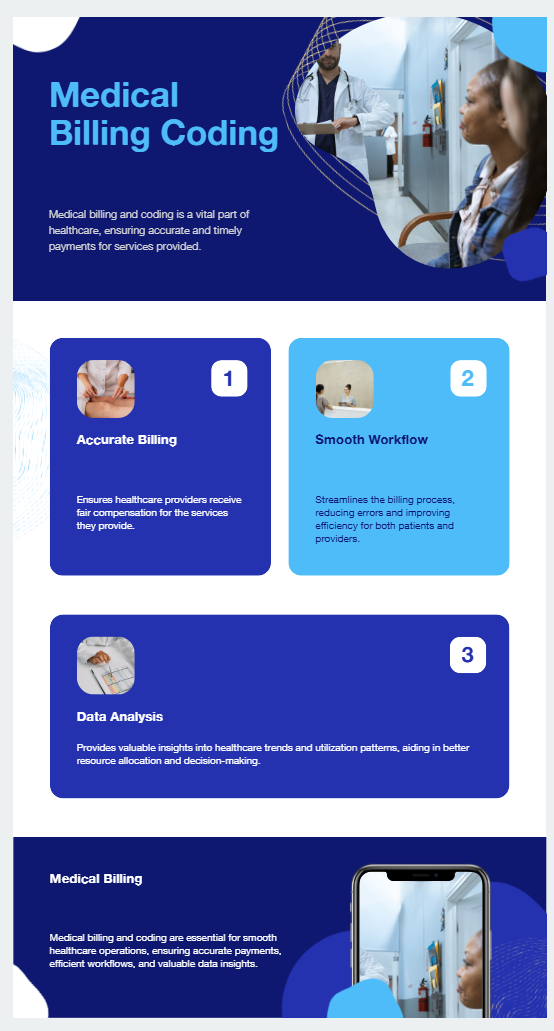Getting Started with Medical Billing and Coding from Home: Your Ultimate 2025 Guide
Wish you could work in healthcare without the long hours, patient drama, or—okay, fine, without being covered in bodily fluids for once? Meet medical billing and coding, where from the comfort of your own pajamas, sipping coffee, you can work on translating medical mysteries into billable codes, all from home.
Those who work in medical coding and billing are the unnotched workers in the healthcare industry. They make sure doctors are paid, hospitals stay open, and insurance companies don’t go crazy. If you’re looking for a flexible, well-paying career without stepping foot in a hospital, obtaining a medical coding and billing certification is the key to unlocking this opportunity.
But how do you get started? What are the skills required? How much is the money? Can you actually do this without a medical degree?
Buckle up because we’re about to unpack everything you need to know to launch your career in remote medical coding and billing—from the best medical billing classes and certifications to job opportunities and work-from-home setups that actually work.

Why Medical Billing and Coding?
If you’re still on the fence, here’s why medical billing and coding is an absolute game-changer in 2025:
High Demand, Low Stress: The U.S. Bureau of Labor Statistics (BLS) predicts an 8% job growth from 2022 to 2032—that’s faster than average.
Remote Work Is Here to Stay: COVID-19 made remote jobs a norm, and healthcare followed suit. More hospitals and clinics now hire coders and billers remotely than ever before.
No Blood, No Scrubs, No Needles: You get the perks of working in healthcare without the ER chaos.
Great Pay, Even for Beginners: Certified medical coders earn an average of $58,000+ per year, with experienced professionals making over $70,000.
Be Your Own Boss: Freelancing and contract work are booming in this field, allowing you to set your own hours and rates.

Step 1: Understand What Medical Billing and Coding Really Is
Before you jump in, let’s break it down:
Medical Coding (The Decoder Role)
Every time you see a doctor, a coder puts what happened (your flu diagnosis, your X-ray, or your stitches) into standardized codes that insurance companies use. The most commonly used coding systems are:
ICD-10-CM: Used for diagnoses.
CPT (Current Procedural Terminology): Used for procedures.
HCPCS (Healthcare Common Procedure Coding System): Used for Medicare/Medicaid claims.
Programmers are required to be very careful since a single incorrect digit may result in denial of benefits or even fraud audit.
Medical Billing (The Money-Maker Role)
Once the coder has done their magic, the medical biller comes along to send those claims to insurance companies, Medicare or patients for payment. They are the ones who follow up on unpaid bills, fix claim errors, and negotiate with insurers.
Both roles can be separate or combined, depending on where you work.
Step 2: The Skills You Need to Succeed
You don’t need a medical degree, but you do need:
Attention to Detail – A tiny error can lead to a denied insurance claim (or worse, a lawsuit).
Medical Terminology Knowledge – Know the difference between gastritis and gastroenteritis (insurance companies sure do).
Tech-Savviness – You’ll use billing software like Epic, Cerner, or Medisoft daily.
Patience (Lots of It) – Because insurance companies love making things complicated.
Strong Communication – You’ll talk to doctors, insurers, and sometimes even confused patients.
Step 3: Certifications That Make You Stand Out (And Earn More Money)
While you can get a job without certification, employers love certified professionals. Here are the top industry-recognized ones:
📌 Certified Professional Coder (CPC) – Offered by AAPC, the most popular certification.
📌 Certified Coding Specialist (CCS) – Issued by AHIMA, great for hospital jobs.
📌 Certified Billing & Coding Specialist (CBCS) – Great for beginners.
Getting certified boosts your salary by 20-30%!
👉 Want the best certification? Check out AMBCI for top-tier medical coding and billing certificates that make you stand out in the job market.
Step 4: Finding Remote Medical Billing & Coding Jobs
Here’s where you can land a remote job:
Hospitals & Clinics (Mayo Clinic, Cleveland Clinic)
Insurance Companies (Aetna, Cigna)
Telehealth Companies (Teladoc Health, Amwell)
Freelance Platforms (Upwork, FlexJobs)
Pro Tip: Network on LinkedIn & join medical coding Facebook groups—many job openings aren’t even advertised!

FAQs (The Stuff No One Tells You)
-
It’s like learning a new language—but if you can memorize Netflix passwords, you can master this.
-
Yes, but certified coders make 20-30% more and land jobs faster.
-
Most programs take 4-6 months, but self-paced online courses can be completed faster.
-
Nope! It’s more about accuracy and logic, not algebra.
-
Entry-level coders make $40K-$50K, while experienced professionals can cross $70K.
-
Dealing with insurance rejections and staying updated with coding changes.
-
Yes! Many coders are independent contractors, setting their own hours and rates.
-
For industry-leading certifications, check out AMBCI—the gold standard for medical coding training.
10 Lesser-Known Facts About Medical Billing & Coding
Medical coders have their own "secret" language—ICD codes look like spy messages!
Live Link: https://codingclarified.com/the-history-of-medical-coding/
The first-ever medical code was created in England in the 1600s.
Live Link: https://hiacode.com/blog/education/a-brief-history-of-medical-coding
Incorrect coding is the #1 reason for denied insurance claims.
Live Link: https://codingclarified.com/the-history-of-medical-coding/
Freelance coders can earn six figures by managing multiple clients.
AI is changing medical coding, but humans are still 100% necessary.
Live Link: https://www.aapc.com/resources/what-is-icd-10
Medical coders can work from anywhere—even from the beach.
Live Link: https://communitycarecollege.edu/medical-billing-coding/icd-10/
Every injury has a code (Yes, even "struck by a cow" has an ICD code).
Live Link: https://communitycarecollege.edu/medical-billing-coding/icd-10/
Coding mistakes can cause legal trouble (Accidental fraud is a thing).
Live Link: https://codingclarified.com/the-history-of-medical-coding/
You don’t need a college degree, just certification and training.
Live Link: https://communitycarecollege.edu/medical-billing-coding/icd-10/
Medical coders help save lives—by making sure hospitals get paid.
Live Link: https://codingclarified.com/the-history-of-medical-coding/
Final Thoughts: Your Future in Medical Billing & Coding Starts Now
If you want a flexible, well-paying career with massive demand, medical billing and coding is your golden ticket.
👉 Ready to get certified? Check outAMBCI for the best medical coding and billing certificates to boost your career today!
